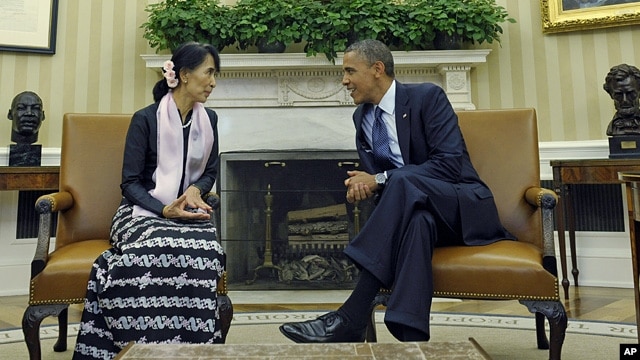
Obama will fly over from Thailand to Yangon for hours-long working visit before proceeding to the East Asia Summit in Phnom Penh, Cambodia.
Obama's trip to Myanmar will be the first ever one to the country in the history by a sitting US president as bilateral relations have been warming up following eased US sanctions in response to the undergoing reforms in the Southeast Asian nation.
Obama's visit also comes more than one-and-half year after the new government of Myanmar took office in March, 2011.
The highest ranking US leader, who visited Myanmar in the history of Myanmar-US relations, was then Vice President Richard Nixon in 1953.
Obama is scheduled to meet his Myanmar counterpart U Thein Sein and opposition leader and parliamentarian Aung San Suu Kyi in Yangon, the former capital, to encourage the country's democratic reform.
Obama's tight schedule includes a public speech to Myanmar people arranged at the venue of Yangon University, once world- famous University of Rangoon historically.
U Thein Sein and Aung San Suu Kyi's successive historic visits to the United States in September-October have opened a new chapter to bilateral ties since re-establishment of diplomatic relations at ambassadorial level on July 11 with Derek Mitchell, U. S. special representative and policy coordinator for Myanmar being assigned as the first US Ambassador to Myanmar.
Washington imposed sanctions on the Southeast Asian nation in May 1997 and expanded them over the years, under which US investment and all imports from Myanmar were banned, assets of certain financial institutions in Myanmar frozen, and visa restrictions imposed on officials of the Myanmar government.
Relations between Myanmar and the United States improved after elected President U Thein Sein initiated a series of reforms since taking office in March 2011, including releasing hundreds of political prisoners, signing cease-fire agreements with several ethnic armed groups, and holding parliamentary by-elections on April 1, in which Aung San Suu Kyi's party won a majority of the open parliamentary seats with Suu Kyi herself gaining a seat of House of Representatives.
The reforms prompted the first visit to Myanmar of Secretary of State Hillary Clinton in December 2011. More visits were successively made by other US officials, like Derek Mitchell, Senator Mitch McConnell and Senator John MaCain in January 2012.
In May, US Treasury relaxed some sanctions on Myanmar to allow financial transactions to support certain humanitarian and development projects in the country and in July when the first US Ambassador Derek Mitchell took office in Yangon in 22 years, the Obama Administration announced further easing of the sanctions, allowing US companies to do business and invest responsibly in Myanmar in the sectors including oil and gas.
In July also, organized by the US-ASEAN Business Council, a delegation of over 70 senior executives from 38 leading US companies, made the first ever historic business mission to Myanmar, vowing to work closely with the Myanmar government for long-term US-Myanmar business relationship.
In August, eight more American companies of the American Chamber of Commerce based in Singapore followed suit to seek investment opportunities in Myanmar.
In September-0ctober, opposition leader and parliamentarian Aung San Suu Kyi and President U Thein Sein made historic visits to the United States successively, bringing the improved Myanmar-U. S. relations to a new high and winning further easing of US import ban on Myanmar goods.
During her visit in Washington DC, Suu Kyi was received by President Barack Obama at the White House who expressed welcome of Myanmar's democratic transition and the recent progress made by President U Thein Sein and Suu Kyi's National League for Democracy Party (NLD).
She met with Clinton and made an address at the US Institute of Peace in Washington, voicing her support of further easing US economic sanctions on Myanmar.
While in the United States, U Thein Sein attended the 67th General Assembly of the United Nations in New York on Sept. 27, where he delivered his first ever speech as a president of Myanmar representing a UN member nation.
In October, US Deputy Secretary of State William Burns visited Myanmar. The two countries vowed to boost partnership in advancing Myanmar's political and economic reforms.
Myanmar and the United States also held the first bilateral dialogue on human rights on the occasion of Burns' visit.
In late October, US Deputy Secretary of Treasury Neal S. Wolin paid a two-day visit to Myanmar which the US government said is a further demonstration of US commitment to partner with Myanmar as it walks down the path of reform.
Wolin voiced US assistance to develop Myanmar's financial sector and improve public financial management.
According to Myanmar official statistics, US investment in Myanmar amounted to 243.49 million US dollars in 15 projects, accounting for merely 0.6 percent of the total as of August 2012 since Myanmar opened to such investment in late 1988 and standing the 9th in position in Myanmar's foreign investment line-up.
The figures also show that bilateral trade between Myanmar and the United States reached 293.64 million US dollars in the fiscal year 2011-12, of which Myanmar's export to the United States amounted to 29.57 million dollars while its import from US stood at 264.07 million dollars.
In the latest development, days before Obama sets foot on Myanmar, the United States further eased import limits on Myanmar goods to support the ongoing reform efforts in the nation and offer new opportunities for businesses in both countries.-The Philippines Star (November 18, 2012 1:01PM)

No comments:
Post a Comment